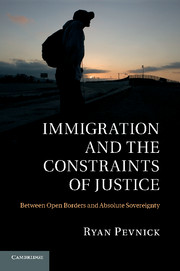Book contents
- Frontmatter
- Contents
- List of illustrations
- Acknowledgments
- 1 Introduction
- 2 Statism, self-determination, and associative ownership
- 3 Refining associative ownership
- 4 Rights-based arguments for open borders
- 5 Distributive justice and open borders
- 6 The significance of national identity
- 7 Applications
- Bibliography
- Index
1 - Introduction
Published online by Cambridge University Press: 24 February 2011
- Frontmatter
- Contents
- List of illustrations
- Acknowledgments
- 1 Introduction
- 2 Statism, self-determination, and associative ownership
- 3 Refining associative ownership
- 4 Rights-based arguments for open borders
- 5 Distributive justice and open borders
- 6 The significance of national identity
- 7 Applications
- Bibliography
- Index
Summary
Modern states claim enormous power over the lives of individuals within their territories. In order to bring into view the extent of these powers, I begin by recounting the story of an immigrant to the United States:
Mezei, a long-time resident of the United States who had journeyed abroad to visit his mother, was excluded on undisclosed security grounds when he returned. After some sixteen months in custody, the government announced that it had abandoned its futile efforts to find a country to which he could be deported. Thereafter, Mezei remained on Ellis Island in what Justice Black in dissent described as an “island prison” in which Mezei must “stay indefinitely, maybe for life.” The Supreme Court summarily rejected Mezei's challenge to his exclusion.
Having never seen the government's evidence, there was of course little for the Court to say. Mezei, it noted, was actually the beneficiary of “legislative grace”; as an excludable alien, the authorities could have kept him aboard the vessel that brought him here rather than extending “temporary haborage” at Ellis Island. Mezei's complaint was with the countries that would not accept him, not with the American government. “An alien in [Mezei's] position,” the Court concluded, “is no more ours than theirs.”
(Schuck 1998, 36)Mezei's story is at least a bit frightening because it vividly illustrates the power that others, through state institutions, regularly claim over us.
- Type
- Chapter
- Information
- Immigration and the Constraints of JusticeBetween Open Borders and Absolute Sovereignty, pp. 1 - 18Publisher: Cambridge University PressPrint publication year: 2011

